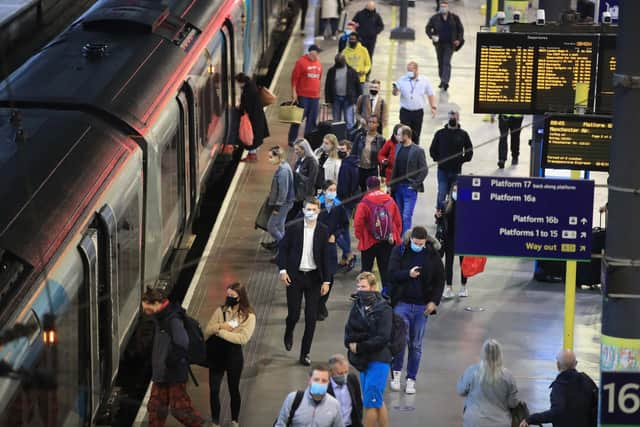Rail ticket experience should mirror Amazon Fresh style retail - Tony Lodge
Boris Johnson’s order to work from home resulted in a 77 per cent drop in rail use which particularly decimated the once hugely lucrative five-day commuter market. The income from this alone covered a large slice of the railways’ cost base and limited the need for more taxpayer support.
Over £15bn of taxpayers’ cash has since been spent to keep the network running despite the numbers commuting Monday to Friday at peak times being just 15 per cent of pre-pandemic levels.
Advertisement
Hide AdAdvertisement
Hide AdNew working practices where people choose to visit the office from Tuesday to Thursday outside of peak times show just how rail has lost part of its old monopoly to virtual conferencing.


There is no reason why this will change as employers support greater working flexibility. Consequently, rail must embrace its own radical change to encourage passengers back with new, bespoke and cheaper offers more closely aligned with passengers’ new working and leisure choices. This must be technology-led with the best and most advanced digital ticketing offer available under the Government’s new Great British Railways (GBR) banner.
Half of all rail journeys are now for leisure. This represents a huge opportunity for rail, particularly in the longer-distance high-speed market where some of the most popular locations are in Yorkshire.
But the key here is the modern, competitively priced ticketing that embraces new technology. There is no reason why the future rail retail experience cannot mirror modern shopping in an Amazon Fresh store. Shoppers download the app, collect their items and then leave without facing any physical payment checkout process. That is not to say that paper ticketing should be totally abolished for those who want and require a physical ticket. Shops should also be able to sell rail tickets especially when many stations in rural and suburban locations are not staffed.
Advertisement
Hide AdAdvertisement
Hide AdBut modern digital ticketing alone is not the only answer; cheaper and more flexible tickets can emerge only if the train services themselves are more in tune with what passengers want and expect. This means more on-track competition, quality and choice. One of the most striking facts about the new post-pandemic world is that it is showing how passenger growth is robust where trains compete for passengers. If one compares the East Coast Main Line (ECML), which connects Yorkshire with London and where four fast train companies (LNER, Grand Central, Hull Trains and Lumo) compete for passengers, then fares are lower than those lines without competition.
Comparing usage between October and December last year with the pre-pandemic period, the ECML operator LNER recorded a significant usage of 83.6 per cent. By contrast, the monopoly operator Chiltern Railways, which connects Birmingham with London, had a relative usage of just 55 per cent. The ECML enjoys robust train and fare competition with its passengers being constantly bombarded with new retail offers and incentives from different operators. But all that said, it is still striking to consider that around 80 per cent of all journeys between York and London (211 miles) occur by car. Clearly, rail has much more work to do on the wider passenger experience.
Unless the railways can adapt to the new travelling environment, we risk a spiral of decline and underinvestment not seen since the 1980s. Fares will have to rise further to cover operating losses which will in turn drive more people on to the roads. There is no guarantee the Treasury will be willing to swallow the losses from subsidising the railways on a far lower user base indefinitely, which could lead to future cuts to lines and services.
Changes in working practices offer an opportunity so long as ministers ask the right questions of the right people – those lost, existing and potential new passengers. The opportunity is clear so long as planners forget about rigid ticketing and stop trying to sweat a peak commuter market which is no longer there; instead the sector must examine the most flexible digital ticketing offer ever conceived which trumps the car and rewards passenger loyalty. A “Rail Miles” scheme is long overdue.
Advertisement
Hide AdAdvertisement
Hide AdThis week rail unions are likely to announce rolling strikes. Stoppages now would deal a huge blow to a network still in intensive care and force people back onto the road. Consequently, the job to get people back on trains will suddenly get very much harder.
- Tony Lodge is author of Changing Track – How to save the railways after the pandemic – published by the Centre for Policy Studies
Comment Guidelines
National World encourages reader discussion on our stories. User feedback, insights and back-and-forth exchanges add a rich layer of context to reporting. Please review our Community Guidelines before commenting.